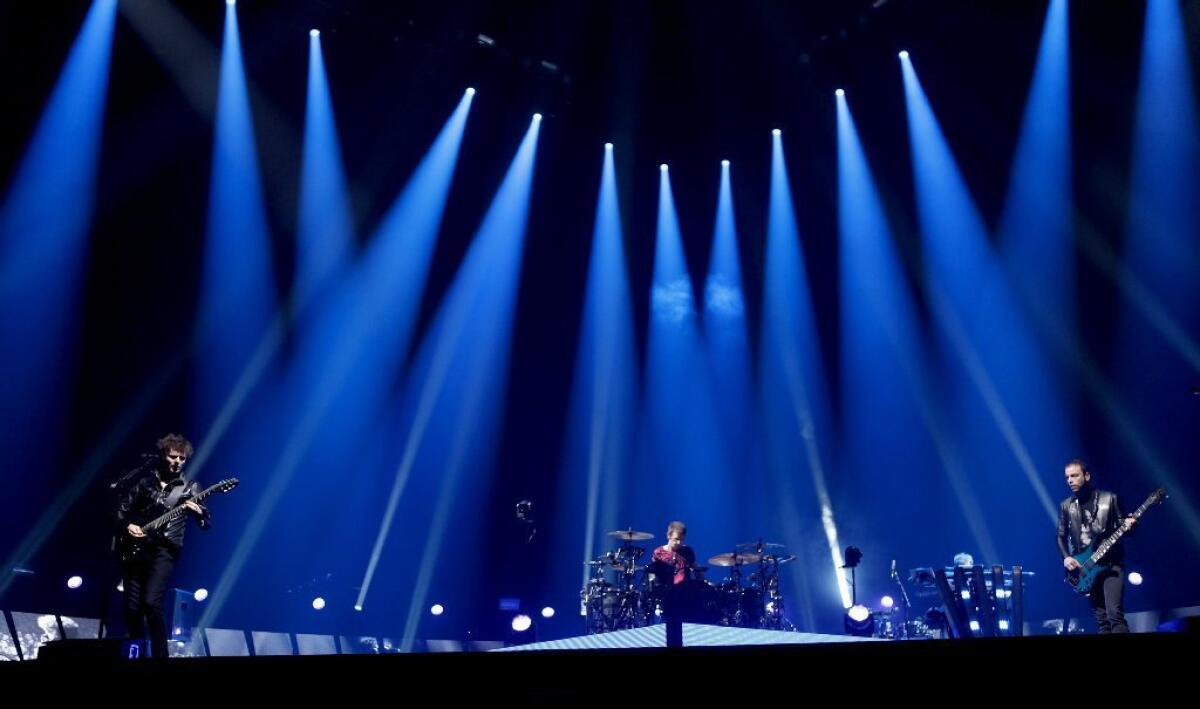Review: Muse goes big -- as always -- at Staples Center

- Share via
The English band Muse does everything on a grand scale: giant prog-rock riffs, elaborate laser-light displays, songs with titles such as “Supremacy” and “Exogenesis: Symphony Part 2 (Cross-Pollination).”
When the International Olympic Committee required an anthem for last summer’s London Games, it knew just where to look. “Survival,” Muse’s heavily orchestrated treatise on athletic determination, could make a round of ping-pong feel epic.
Yet despite the band’s well-established commitment to hugeness -- it broke through to American audiences in 2006 with “Supermassive Black Hole” -- you had to register some kind of surprise at the way it packed Staples Center on Wednesday night, shortly after the group launched a North American tour this week in San Diego. Not because Muse, which fills stadiums in Europe, had trouble adapting to the downtown arena’s cavernous dimensions; if anything, it seemed occasionally to tamp down the action in order to prove it can do more than bludgeon.
But Muse is a weird band -- deeply weird, in fact, obsessed with hidden pockets of science and technology and prone to crypto-libertarian ruminations on government overreach. Frontman Matt Bellamy has said that he was inspired to write the trio’s most recent studio album, last year’s “The 2nd Law,” after watching economists discuss thermodynamics on the BBC. He also has a child with Kate Hudson, the star of “How to Lose a Guy in 10 Days.”
And there he and his bandmates were Wednesday, playing the first of three concerts at Staples -- one more than Madonna, Lady Gaga and Justin Bieber have each done in recent months. (Representatives for the group said Thursday that all three shows had sold out, though restricted-view seats for Thursday’s and Saturday’s gigs were still available at press time.)
Muse used the rarefied setting -- which it reached through a variety of strategies, including steady touring and savvy licensing deals -- to exercise a deep-seated love of spectacle. In “Madness,” Bellamy put on a pair of sunglasses that flashed the song’s lyrics across their lenses; later, a pyramid of virtual televisions descended from above the stage during “Stockholm Syndrome,” swallowing up drummer Dominic Howard. Throughout its nearly two-hour set, the band (which also includes bassist Chris Wolstenholme and, on tour, keyboardist Morgan Nicholls) was surrounded by roving beams of light carefully coordinated with the music.
And the music was no less showy. Muse opened with the harsh dubstep textures of “The 2nd Law: Unsustainable” and kept adding other flavors to its guitar-rock foundation: sleek machine beats for “Madness” and “Undisclosed Desires,” fuzzy funk bass in “Panic Station” and “Supermassive Black Hole.” For the sci-fi ballad “Explorers,” Bellamy plunked out plaintive chords on a transparent grand piano; the song sounded uncannily like “No Surprises” by Radiohead, a frequent comparison for Muse.
As comfortable as the men were in that rock-god role, though, a subtext seemed to run just below the surface of Wednesday’s show, observable in some of the images flashing on the many video screens onstage and in the occasional look on Bellamy’s face as he took in the sea of pumping fists before him. The singer appeared to be working out the difference between a critique of power and power itself -- between what it means to sing about “the fat cats [having] a heart attack,” as he did in “Uprising,” and to be the guy exerting a fair amount of control over an arena full of people.
The paradox didn’t appear to unsettle Bellamy. But you could tell that he thought it -- like everything about Muse -- was strange in a major way.
More to Read
The biggest entertainment stories
Get our big stories about Hollywood, film, television, music, arts, culture and more right in your inbox as soon as they publish.
You may occasionally receive promotional content from the Los Angeles Times.










